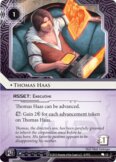Oracle May is a fun card.
It's delightful to flip cards off the top of your deck.
But deckbuilding with Oracle May offers a challenge. While gaining 2 and drawing a card for a single click is a great upside, instead taking the top card of your stack and dumping it into your heap when you guess wrong is a little underwhelming.
There are three solutions to this problem:
1) Know the top card of your stack
There are a few cards that let you know what is on top of your deck: Motivation, Rolodex, and Angel Arena all let you peak to make your guess.
Test Run lets you know there is a program on top of your deck, though that trick only works once for each time you play Test Run.
You can also use Mr. Li to draw half your deck, placing the other half on the bottom, and then you can then use Oracle May to pick up the rest. This will take a lot of clicks, a lot of turns, and a perfect memory, so hopefully you have those if you try this approach.
If you are using any of these approaches, you might also consider finding room for another one influence card that cares about the top of your deck: Eureka!
2. Have a pretty good idea what is on top of your stack
This is one of the most popular Oracle May decks on NetrunnerDB. The archetype is often called 'String Theory'. Because the deck is almost entirely events, you can guess event every time and be right almost every time.
The String Theory deck also has Test Run so when you guess wrong, you can save your poor program from the heap.
You could theoretically build a deck like this for any card type in any faction. Events are probably the easiest but there may be other paths. A hardware deck with Clone Chips to get your programs back??? Nothing but good sense is stopping you!
When building these deck, you are of course allowed to include cards of other types, but just know that every off-type card you include makes Oracle May a little worse.
3. #YOLO
Just put Oracle May in your deck and believe in the heart of the cards. Call shots. Be right. Every time. Have your opponent wonder how you are doing it.
They might think you are cheating but you aren't.
You are just THE ONE.
BONUS OPTION: Don't bother
How much more efficient is an Oracle May click than a Symmetrical Visage click? Not that much less efficient, plus you aren't revealing to the corp the cards you are drawing. Is the one influence and severe drawback (which you should probably build around) worth it? Maybe not.
But, both as a deckbuilder and as a player, Oracle May is a fun card.

